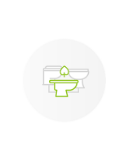About Greywater
Waterless composting toilets and greywater systems go hand in hand. A waterless composting toilet will manage all human excreta; however, when it comes to household waste, you still need to look after the wastewater that comes from your kitchen sinks, basins, showers, bathtubs, washing machines, dishwashers, etc. All this comes under the category of greywater.
Firstly, what is greywater?
Greywater is the wastewater produced from the hand basin, shower, bath, washing machine, laundry tub, kitchen sink and dishwasher. Greywater from the kitchen sink or dishwasher is generally too high in grease and oil to be reused successfully and should be treated differently from all other greywater.
Note: that greywater it is not the water from a flushing toilet as this is contaminated with human waste and is called blackwater.
Greywater is essentially all household wastewater from kitchen sinks, dishwashers, laundry tubs, washing machines, baths, tubs and basins. Usually, a building consent is required for the collection and use of greywater. It’s important to remember that greywater may contain certain contaminants and therefore is not suitable for cooking, bathing or drinking.
Water that may contain faecal matter, such as water which comes from your toilet or bidet, is known as blackwater. This water cannot be reused anywhere in the house and must go into either a septic system, another form of treatment or mains sewage. Our recommendation is (obviously) to eliminate the need for blackwater treatment through the use of a waterless composting toilet system.
Why divert greywater from blackwater?
The simple reason to argue for the separate treatment of greywater is that water is a valuable resource. Greywater, when treated properly, can be an asset and can be used on-site as part of irrigation schemes. This reuse of water allows for more efficient homes, which consume fewer resources and therefore have a lower negative environmental impact.
Reusing greywater
There are many reasons to reuse your grey water. These can include water savings, reduced water and wastewater charges (saving you money), and overall helping to reduce demand for water supplies in your area.
Ultimately, there are different levels of greywater reuse. This can include the use of water from sinks to flushing toilets (not required in our waterless composting toilets, but relevant in micro-flush systems such as the Sun-Mar micro flush), washing of clothes, and also irrigation in the garden.
It’s important to note here that due to the increased risk of contamination, greywater from the kitchen sink is also deemed unfit for reuse and requires additional treatment.
When storing greywater for reuse, it’s essential that it’s kept well-stored and separate from the freshwater supplies. Greywater must be clearly labelled to ensure that nobody drinks from this supply.
The most common reuse of grey water is the irrigation of gardens. This allows users to maintain a lush and green garden all year round simply by using water that would otherwise be going down the drain. On average, this allows households to reduce their yearly water use by up to 50% depending on the size of their garden, significantly reducing expenses in areas with metered water.
How a greywater system works
There are many different types of greywater treatment systems on the market, and ultimately, it comes down to the user to research and specify the best solution for their particular application.
In most instances, greywater treatment begins with water from basins, baths, showers, etc. being piped into a surge tank. This enables the grey water to be briefly held before being discharged to either a direct irrigation system or an additional treatment system. This can occur either through gravity or the use of a pump.
It’s important to note that the surge tank must be emptied each time the greywater is dispersed, and that no greywater should be allowed to sit for extended periods of time in the tank. Should this happen, undesirable bacteriological and viral growth may be allowed to occur in the tank. This should be avoided at all costs.
The surge tank for the greywater should be vented with a trapped overflow. And discharge must lead directly into the sewer or to an onsite discharge area. It must be sealed and vermin-proof.
Treatment of greywater
Again, there are several options when it comes to the treatment of greywater, and the specific option you choose should be specifically suited to your unique application. Options for treatment may include filtering, settling of solids, flotation, and operation of lighter solids, anaerobic or aerobic digestion, chemical or UV disinfection. Once set up, greywater collection and reuse are hassle-free and low maintenance, although they do tend to require some level of attention. Greywater filters, for example, will require periodic replacement, and any solids that build up in tanks must be removed regularly.
Purchase ready-made greywater systems for your home
In New Zealand, commercially manufactured greywater systems that meet the requirements for treatment and reuse of water are available. These units are typically comprised of a plastic gully with a grating, a submersible pump which automatically moves the greywater to the irrigation system, a manual or remote override switch which allows for greywater to be diverted to the sewer if required and a partially self-cleaning filter.
What We Offer
There are many greywater treatment options, as each site has its unique set of challenges and therefore is suited to different systems.
WCTNZ® is proud to provide a range of well-designed and supported greywater technologies, both in the treatment category and diversion systems type for both heavy greywater and light greywater management. Please see this link for reference on technologies.
Pairing a suitable greywater system with a waterless composting toilet is an ideal way to maximise the use of your resources on site and build resilience, efficiency, and environmental consciousness into your home.
Need help choosing a system? Call WCTNZ® on 0800 022 027 for free advice on system specification and setup. Advanced design consultancy services are also available.
How do I find the greywater system that’s right for my property and that will complement my composting toilet?
Talk to us to ensure that you correctly match your greywater system to your composting toilet! We provide free advice on system specification and set-up.
Types of Greywater Technologies
Greywater for irrigation (RE-USE)
Greywater irrigation has long been practised in areas with a limited water supply. However, proper precautions for its use have not always been in place. This has posed a problem for health officials, who believe there is no correct method for managing greywater to both balance user water needs with public safety considerations. While the engineering of these systems is still a relatively new technology, it is one that is progressing rapidly. Greywater systems can now meet both environmental and waste management requirements, while safely utilising the nutrient content in the effluent.
The options for safely using greywater as a source for irrigation are many and diverse.
There are two types of greywater systems for the domestic market that both require local government approval and state government guidelines for installation:
GWDD (Greywater Diversion Device) Diversion Systems are a primary filtration device that provides discharge to the land within a 24-hour period and are either gravity or pumped
DGTS (Domestic Greywater Treatment Systems) - Treatment systems, upgrade water quality in the process and should provide a secondary treatment level, this will provide a more flexibility means of discharge and re-use irrigation applications. For light use
CGTS (Commercial Greywater Treatment Systems) - Treatment systems, upgrade water quality in the process and should provide a secondary treatment level, this will provide a more flexibility means of discharge and re-use irrigation applications. For high use
N.B. All greywater diversion systems MUST use by law, a subsurface or substrata irrigation discharge system, such as drip irrigation.
N.B. If a greywater treatment system DGTS is being used rather than a Greywater Diversion Device GWDD, the waste water from the kitchen can be included.
Recommendation for Consideration
The ideal means of discharge for greywater is done by pressurized dripper lines, not gravity feed trenches Read About Dripper Systems Here
For all greywater sources when including kitchen wastewater a DGTS system must be used.
If irrigation with greywater (Re-Use) is desired when kitchen wastewater is involved, a dual system can be set up onsite where about 50% of the greywater is used via a GWDD & GWDD-irrigation system and the back-flush waste from the GWDD is diverted into a DGTS or CGTS and treated before discharge (Re-Use)onsite.
| Greywater Shades | Heavy | Dark | Medium | Medium | Light |
| Types of Wastewater | Kitchen | Laundry | Bathing | Hand Basin | Floor Drains |
| Types of Treatment | DGTS / CGTS | DGTS / CGTS / GWDD | DGTS / CGTS / GWDD | GWDD | GWDD |
*Greywater is often referred to in shades. 5 shades are known.
Copyright © 2025 Waterless Composting Toilets NZ Limited (WCTNZ®). All rights reserved.
This content has been reviewed and approved by Dylan Timney, Managing Director of WCTNZ®, who brings over 17 years of composting toilet expertise and 16 years of experience in building and eco-construction in New Zealand.
Last reviewed: July 10, 2025














